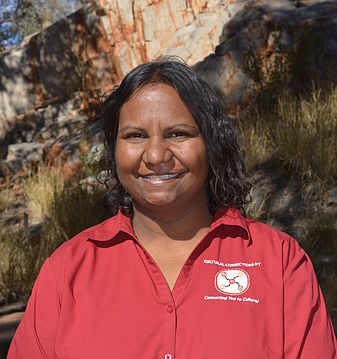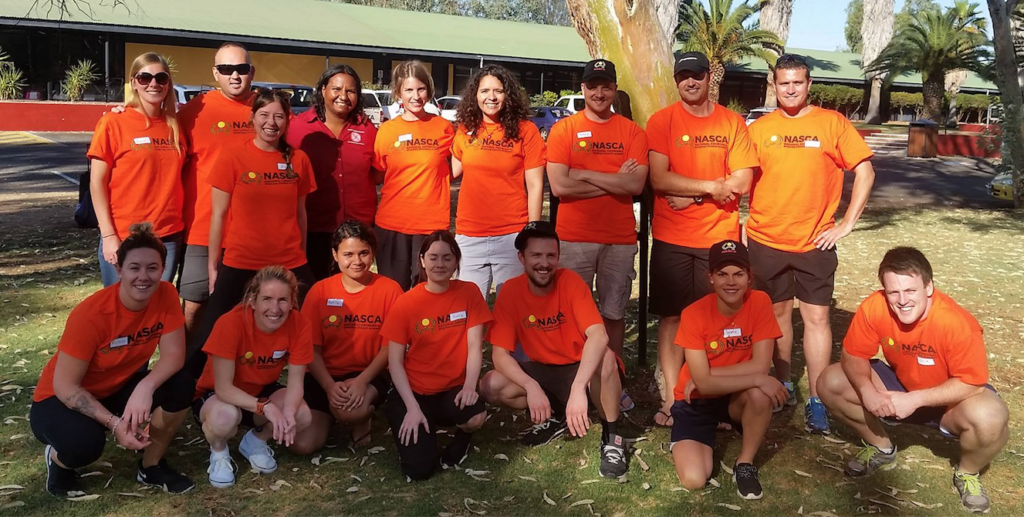Improving Cultural Understanding for Volunteers in Central Australia
-
12 November 2016
-
4 min read


For a number of years Alice Springs woman Deanella Mack has created a platform for Aboriginal cultures and concepts to be better understood from a Western perspective.
It is a role Deanella never expected she’d be doing but one that she sees as vitally important for the cultural sustainability of Alice Springs and surrounding regions. Many organisations that work with Aboriginal staff, students or clients have found her unique approach to practical storytelling as being key to how that organisation then had greater outcomes when engaging across cultures. Of some organisations, she says; “It happens too often that they try to come in and change things very quickly and they miss the fact that it’s important to take time to engage the community.”
Deanella acknowledges that many people get information around the symptoms of “colonialism, invasion, settlement” with regards to Aboriginal communities from non-reliable sources and therefore “some people often have very strong opinions about something they have very little or no knowledge about”. She says she has a “non-aggressive approach” which has seen her create a sustainable business called Cultural Connections that uses a number of different methods to cater for organisations, institutions and businesses to better engage with Central Australian Aboriginal communities.
She sees however that a system that has failed Aboriginal people in Central Australia for generations has also failed non-Indigenous people in how they learn about or appreciate Aboriginal cultures, histories and concepts.
Deanella believes cultural misunderstandings, often come with the best intentions and as being “like when you’re driving a car and you feel something’s wrong but you don’t know how to fix it. Others may not even think anything’s wrong.” Those that have had the most positive experiences in her sessions and went on to positively impact communities later were “open-minded and had the willingness to receive new info that may not sit well with their current beliefs and experiences”.
“People often need to be challenged on how and why they came to get the ideas they have around Indigenous Australians, Deanella does that in a very sensitive way”
The National Aboriginal Sporting Chance Academy (NASCA), based in New South Wales is one such organisation that utilises Cultural Connections cross-cultural training to better equip the Indigenous and non-Indigenous staff and volunteers who work across six different remote Central Australian communities four times a year. CEO Leanne Townsend notes, “It is vitally important that as an organisation from outside of the area that uses skilled volunteers that we are as ready as possible to work within the communities in which we go”.
NASCA attracts people with a passion for Aboriginal cultures and a range of skills, however almost all certainly require a more in depth understanding of the breadth of contemporary and historical issues that are unique to Central Australian Aboriginal communities. Leanne, an Anaiwan woman from Uralla in New South Wales says Deanella’s training “opens the minds of the participants in a way that rarely happens with some other cultural awareness training.” She adds “people often need to be challenged on how and why they came to get the ideas they have around Indigenous Australians, Deanella does that in a very sensitive way”. Jessica, who volunteered for NASCA at Ali Curung said “I have done a lot of cultural awareness training before for my work and this was by far the best I have attended and been a part of. Deanella was absolutely amazing.”

Deanella believes what works well in Central Australian communities comes down to more than anything having patience and being willing to do things a bit differently. “You can come with the best-laid plans then they go out the window. So you need to be flexible and not jump to conclusions otherwise it will be very frustrating for everyone involved. It’s also important for community to identify the project they want to see, not the other way around”.
Deanella is not only motivated by seeing more community-led initiatives in Central Australia but also to show her three children the value of working hard in a field you are passionate about. Her own sense of duty was passed to her by her Western Arrente Grandmother and Alyawarre Grandfather who were busy navigating the complexities across Western and Aboriginal cultures long before she was born. Amazingly her Grandmother once said of her ‘employers’ in Hamilton Downs; “They took our land and made us work for nothing but they were lovely people.”
Historically, Deanella says “The Aboriginal cultural eco-system has had a lot of disturbances over the past 200 plus years” and adds “There are reasons behind why people are using drugs or alcohol and today we are dealing with the symptoms not the root causes.”
Given how many organisations work with Aboriginal and Torres Strait Islander people across the country Deanella believes there is still an education gap in this workforce; she believes that as with NASCA “cultural awareness should be imbedded in the cultural practices of these organisations.” She adds that Aboriginal employees of mainstream organisations “often end up being mentors and unofficial cultural awareness trainers in addition to their paid role”. However problems also often lie in the inability of Aboriginal people to put into words what the challenges are; “We deal with misunderstandings every day and sometimes we [as Aboriginal people] aren’t able to articulate what the misunderstanding is.” She uses another analogy when she says unfortunately for some people trying their best in a non-Western setting can be “like someone operating on a brain, but the person doing the operation isn’t a neurosurgeon.” Fortunately she has a belief that there is a movement in the broader community to better engage with Aboriginal people and communities provided Aboriginal people have the power to be able to initiate the movement with the support of skilled outsiders. “No one can save us but ourselves, we just need people with skills and knowledge to take us along that path”.
“These days the knowledge around cross-cultural awareness is at your finger tips, so ignorance is no longer an excuse.”DEANELLA
“These days the knowledge around cross-cultural awareness is at your finger tips, so ignorance is no longer an excuse”
NASCA will continue to use the expertise of Deanella and Cultural Connections in 2017 to enhance the abilities of our skilled volunteers.
